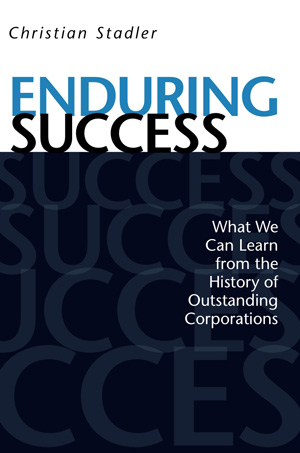
In Enduring Success I address a key question in business today: How can companies succeed over time?
I argue that companies are able to adapt to a constantly changing environment by being intelligently conservative. Which contrasts the widely held belief that great companies succeed because they are pioneering innovators that place bold bets on great ideas.
The argument unfolds in layers.
First, I describe what companies that succeeded for at least 100 years did differently from others. My main argument is that they made sure that their strategy and organizational setup fit the environment of their business.
Second, I explain how these companies did this consistently over time. I develop five principles, stressing the importance of keeping reserves for difficult times, investing in several ideas and businesses rather than a single one, making the most of existing knowledge rather than permanently chasing new insights, developing mechanisms to learn from past mistakes, and being sensitive to the culture of a company when it needs to change.
Third, I elaborate on the characteristics of an intelligently conservative leader. I argue that, similar to a soccer coach, intelligently conservative leaders create winning teams by providing appropriate incentive structures, sufficient training, and occasionally substituting a player. They cannot score the goals themselves.
I am aware that the notion that you survive radical environmental changes by being intelligently conservative is counterintuitive. Therefore, I take great care in developing my argument. I provide a detailed description of the data I use and how I analyzed the information I gathered. All the chapters are carefully referenced, and I also devote one chapter to a comparison of my ideas with other work on long-term success.
“Companies often spend millions on strategy evaluations without learning from their past experience or studying what they and other companies did in comparable past situations.”
I was always fascinated by the richness of history—and greatly frustrated that companies often spend millions on strategy evaluations without learning from their past experience or studying what they and other companies did in comparable past situations.
At rare occasions we remember that we can learn a lot from history. For example, in the past couple of years many scholars, commentators, and politicians have drawn attention to lessons to be learnt from the Great Depression or the Asian Financial Crisis.
I think that we can leverage history much more often. And my book is an attempt to do exactly this.
I selected 9 companies that outperformed stock markets by at least the factor 15 over the past 50 years, and that have been around for more than 100 years—and matched each of them with a comparison company that did well but not quite as well.
With the help of 8 researchers, I then collected vast amounts of information related to these companies. We focused primarily on written accounts about the history of top and comparison companies, on material from their corporate archives, and on interviews with top executives, including 19 active and retired CEOs and chairmen.
As we compared the different histories, we slowly started to develop interpretations. It was a step-by-step process. For example, by comparing Shell and BP a certain idea would emerge. We then tested whether this interpretation would also work for the other companies we studied. Only those ideas that held across the board made it into the book.
No doubt, others might interpret our empirical material differently. But by carefully presenting the stories, the book provides the reader with both a compelling interpretation and an opportunity to make his or her own judgments. Hopefully this will encourage others to use history as a source for business insights.
A section in Chapter 3 on how companies learn over time and across space is titled “Learning Stories.”
Naturally, corporations love to tell heroic stories. They help to motivate people and inspire others to follow their example. Which makes sense. But great companies are also prepared to learn from their own mishaps rather than sweeping them under the carpet.
In the Anglo-Dutch oil giant Shell, for example, a powerful story related to Henry Deterding, the company’s former CEO. Henry was a brilliant businessman who engineered the merger between the British Shell Transport and Trading and Royal Dutch in 1907. His success put him in a position of unchallenged power. Unfortunately, after the nationalization of Shell by communist Russia, he felt that only Adolf Hitler could stop the enemies of capitalism. Fortunately, he retired before he could create any compromising links between Shell and Nazi Germany.
It is interesting how Shell dealt with this near disaster in subsequent years. We would expect them to quickly forget about the embarrassment. They did not. On the contrary, they were determined to learn from it.
When in 1964 McKinsey, an influential consulting company, recommended that Shell reorganizes and installs a strong CEO, the company remembered the story of Henry Deterding. They decided that, in a politically-sensitive industry like theirs, it would be better for a number of individuals to share responsibilities. So, instead, Shell installed a committee of managing directors. The outside world never liked its structure but Shell had learnt from its past.
“Great companies are prepared to learn from their own mishaps rather than sweeping them under the carpet.”
Whenever the economy takes a dive in the manner we experienced after the subprime housing crisis, the public, media, and businesspeople seem to wonder why some corporate giants fail while others survive.
This book provides some systematic insights from history. Rather than speculating about potential tips and tricks, the book builds upon careful analysis and recalls insightful stories from the past.
As I talked to managers across the world, and was questioned by journalists about my work, they were always particularly interested in knowing to what extent I thought my insights would help companies in the future.
My answer has always been the same. We have a tendency to view our times as unparalleled and uniquely challenging. In fact, every generation does that.
When Romans learned that Julius Caesar was assassinated in the Senate in 42 B.C. they surely thought the world would come to an end. When, in 1966, Neil Armstrong raised the American flag on the moon, the exploration of space no longer seemed pure science fiction. And, when in 1989, the Berlin Wall tumbled down, millions of people cheered to a new world order.
Yes, every generation faces a unique set of challenges. This, however, does not mean that we cannot learn from past experiences.
The companies studied in Enduring Success survived the Great Depression, two World Wars, and the Oil Crisis. They saw the advent of new technologies such as television, air travel, and the internet. Their history may not provide immediate solutions for specific business’ problems—but it does provide profound insights into how companies can approach the challenges they face and which strategies can help them prevail.


Christian Stadler grew up in the Austrian Alps. He was first introduced to the fascination of history by his father, who taught the subject to 10 – 14 year olds. Christian started his academic career as an assistant professor at Innsbruck University, then moved to Tuck School of Business at Dartmouth, and currently teaches strategy at the University of Bath in the UK. His research in the past decade focused on long-living corporations””how they grow, adapt, and consistently beat their competitors. Christian is the author of Enduring Success: What We Can Learn from the History of Outstanding Corporations, featured in his Rorotoko interview (see also the book’s own site).